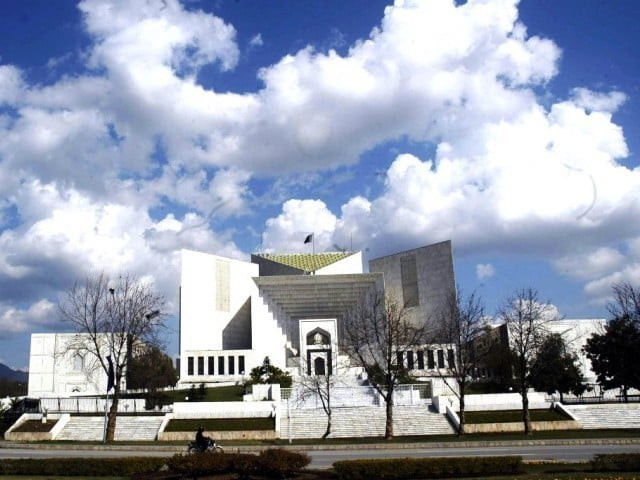Verdict on 21st, 18th amendments: Government’s failure to file review surprises legal experts
Say Supreme Court’s judgment has serious implications for parliament’s powers

Supreme Court. PHOTO: EXPRESS/FILE
“I’ve not received any instructions to file a review petition against the August 5 judgment,” said Attorney General for Pakistan (AGP) Salman Aslam Butt. Under the Supreme Court’s rules, a petitioner has to file a review petition within 30 days of the pronouncement of a judgment.
Legal experts believe though most judges of the top court did not strike down the constitutional amendments, they also declared that parliament’s power to amend the Constitution is subject to implied limitations.

They are surprised that the federal government let the deadline pass and did not file a review petition. They say parliamentarians are also ignored of the verdict’s repercussions and did not ask the government to challenge it, which may affect supremacy of parliament.
Five judges of the top court – Justice Jawwad S Khawaja, Justice Ejaz Afzal Khan, Justice Ijaz Ahmad Chaudhry, Justice Dost Muhammad Khan and Justice Qazi Faez Isa – had struck down the 21st constitutional amendment.
Likewise, eight judges had dismissed the petitions against the 18th and 21st amendments but noted that parliament, in view of Articles 238 and 239, is vested with the power to amend the Constitution as long as “the salient features of the Constitution are not repealed, abrogated or substantively altered”.
They declared that democracy, parliamentary form of government and independence of the judiciary are the silent features of the Constitution. These judges included Justice Anwar Zaheer Jamali, Justice Sarmad Jalal Osmany, Justice Amir Hani Muslim, Justice Gulzar Ahmed, Justice Sh Azmat Saeed, Justice Mushir Alam, Justice Umar Ata Bandial and Justice Maqbool Baqar.
However, four judges of the top court – Justice Nasirul Mulk, Justice Mian Saqib Nisar, Justice Asif Saeed Khosa and Justice Iqbal Hameed ur Rehman – had endorsed the government's stance, rejected the basic structure theory and declared that parliament is the supreme institution and can bring any amendment in the Constitution.
A senior law officer told The Express Tribune that the silent features of the Constitution, which have been declared by eight judges, are self-contradictory. “On the one side, they have declared democracy as the feature of the Constitution but, on the other side, they have also stated that parliamentary form of government is a feature of the Constitution,” he said.
Senior lawyer Tariq Mahmood said if a party wins an election on the slogan that it will change the parliamentary form of government into presidential form than it can amend the Constitution according to its manifesto and the court cannot strike down that amendment
Supreme Court Bar Association former president Kamran Murtaza said nobody is happy as everyone, including the military, bars and the executive, has reservations over the ruling. “Parliament’s supremacy has been undermined by the judgment but parliament is totally ignorant of it,” he said, adding that this ruling will open a Pandora’s box.
Published in The Express Tribune, September 14th, 2015.



















COMMENTS
Comments are moderated and generally will be posted if they are on-topic and not abusive.
For more information, please see our Comments FAQ